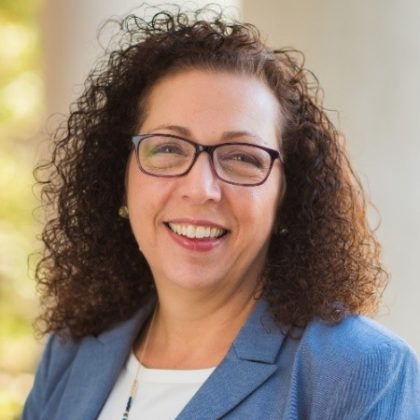In this month’s At the Helm, our Senior Vice President Tracy Marshall sat down with Kathy Marchi, Chief Executive Officer and President at Samaritans Inc., which has provided lifesaving suicide prevention services in Massachusetts for forty-seven years. Tracy and Kathy discuss how Samaritans is fulfilling and expanding its mission, the important role the organization’s supporters play, and the greatest challenges and triumphs Kathy has experienced during her two years in the role.
Tracy: You have held a variety of leadership roles at a range of institutions, including MIT, The Newton Partnership Child Care Scholarship Fund, Newton Public Schools, and The Genesis Foundation for Children. How did your career lead you to Samaritans?

Kathy Marchi
Kathy: For twenty-five years, I lived in NYC and held roles at both for-profit and nonprofit organizations. When we moved to Massachusetts, I felt like it was the right time—both in my personal life and in my career—to really plant myself in the nonprofit sector. It was the work I wanted to be doing, and it was important to me to find a mission that was directly impacting people and connecting to their present needs.
I first came to know Samaritans about eight years ago. My family and I were living in Newton, and I was working in the public school system when our community experienced three teen suicides. My focus shifted from the grant work I had been doing to addressing the sudden needs of our community. We were asking: How do we recover from this loss? What do we do with this experience of losing three teenagers? Samaritans, along with other organizations, came in to help stabilize our community and provide grief support and suicide prevention workshops. Their help was invaluable. Right around that time, the grant I was working on ended, and I joined the MIT Sloan School as the Director of Alumni Relations. I was still feeling a deep need to have an impact on the immediate needs of the people in my community. I became very involved with a local food pantry and joined the board. And then, Samaritans began its search for a new Executive Director. Development Guild reached out to me, and I was beyond thrilled by the opportunity. It felt like a culmination of my experiences and what mattered most to me. Everything came together.
You joined Samaritans in December of 2019, just a few months before the onset of the pandemic. What have the first couple years in your role looked like? What have been the greatest triumphs? The greatest challenges?
Like so many organizations, we have experienced the challenges associated with going virtual. We’re missing out on the impromptu mentoring and problem solving, and face-to-face relationship building that happens when we’re in person and crossing paths with each other throughout the day. We have also had to build systems, processes and procedures that didn’t exist before. That was a challenge at first but has become a great triumph. Going virtual has allowed us to expand our services; for instance, we can now train volunteers virtually, and more people can access our grief support services now that they are virtual.
So, building this infrastructure and evolving our programs have been real triumphs. Additionally, the donor and volunteer support we have received has been extraordinary. It’s a tremendous thing to see people wanting to help at a time when so many of us are struggling. They’ve come to us in great numbers; it’s very inspiring.
Equity and access can have a significant impact on mental health. How does Samaritans’ mission delivery reflect this reality?
We have always offered our services to anyone who needs them, free of charge, and 24/7. That said, the past couple years have been a time of deep reflection. We have focused on connecting with the communities where equity and/or access to mental health services and support is limited, and forming partnerships with trusted organizations in the Black Boston community. We want to provide expertise on suicide prevention so folks know how to interact with someone who is struggling, the questions they might ask, what they might want to say to that person, the risk factors to look for, etc. In turn, we continuously are learning what people need from our organization.
This area of work continues to be a high priority for Samaritans and is a stated goal in our new strategic plan including improvement in our cultural competencies and language capacities. We are optimistic about making meaningful progress on how mental health support is provided with equity.
This has also been a personal priority of mine as a leader. I have just become a member of LeadBoston 2022 class. I am very excited about the chance to increase my understanding of the systems that our organizations take part in and are influenced by, and to discover how we can evolve to better address DEI in meaningful ways. It’s an incredible opportunity to be part of this program.
As the leader of an organization dedicated to providing life-saving mental health services, how do you think about and address the mental health of your own staff?
It is a priority for us. Culturally, we’re evolving at Samaritans to talk about meaningful self-care and what it means to set and respect boundaries. Our staff cares so deeply about the work that we do that it can be hard to set it down and take a break, especially when there’s always work to be done and always a need for support. But we’re really prioritizing the setting of those boundaries. This year, we started an account to help offset co-pays for mental health services for all eligible staff. For us it’s about walking the walk, and truly living our values both externally and internally.
You mentioned how your supporters have been tremendous. Tell me more about how they’ve helped you fulfill your mission.
Quite simply, we cannot fulfill our mission without them. In the past year, our volunteers dedicated 37,000 hours to answering phones, facilitating meetings for suicide loss survivors, and providing support. It’s not an overstatement to say they make much of our work possible. And that of course includes our board members and council members too – their support is invaluable.
Our donor support in the last two years has been extraordinary as well. I think they’ve been so generous because we all see ourselves in Samaritans’ mission – whether it’s because you’ve needed to call a helpline before, or you have lost someone to suicide. We all know how difficult things are in general right now – we’re dealing with our personal lives, business lives, and the pandemic. Whatever your stressors were pre-COVID, they’re often even greater now. I will say – one of the great things of this time is that we are talking about mental health concerns more and more. The door has been cracked open, and now, it’s our responsibility as an organization to push the door wide open and keep the conversation going. We need to break down the stigma that is attached to mental health struggles so that people can access care sooner and more effectively and not struggle alone. It’s our volunteers and supporters who enable us to make that possible. Samaritans raises its budget every single year. Their support is essential and phenomenal.
What is in Samaritans’ future? What do you hope to achieve in 2022?
We hope to achieve a lot! We just finished a 5-year strategic plan at the end of last year, so we are now beginning to operationalize it. In addition to setting fiscal goals, we set goals around strengthening our infrastructure and preparing to expand our organization in a way that will enable us to help more people. As the biggest and busiest helpline center in the state of Massachusetts, I feel a responsibility for us to be able to answer more calls, which means we need the technology, volunteers, and systems in place to do so.
I’m very excited about the program goals we have named in our plan – especially those that are new and different. I think we will be even more successful at helping those who are at the greatest risk of suicide at the time when they are in the greatest need.
We also want to continue to spread awareness in the community that we’re here to provide care and support and that people don’t need to struggle on their own – that will continue to be a big focus of 2022.
What advice would you share for fellow leaders in the nonprofit space?
It may sound obvious, but I think an authentic commitment to mission is essential. To do the work effectively, you have to really deeply and authentically care.
I think an effective leader also knows when to get out of the way and let others tell the story. I prefer, when possible, to have the people who benefit from the work we do to be the ones to share their stories and to communicate that impact.
Lastly, I would say that I think leaders need to be vulnerable and willing to learn. If you allow yourself that, it can make all the difference.


